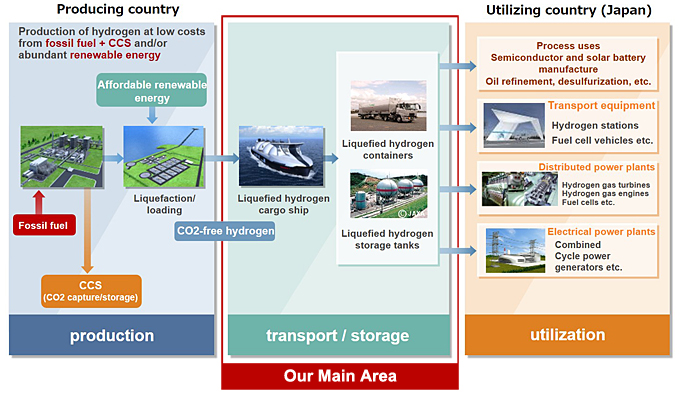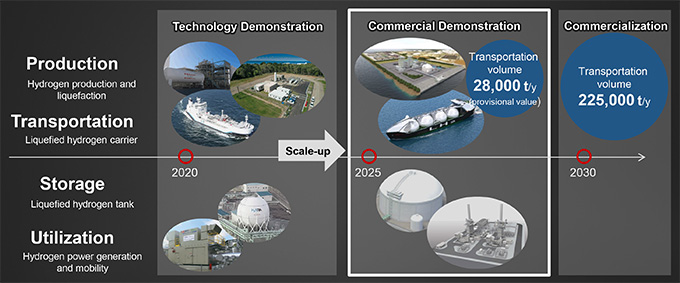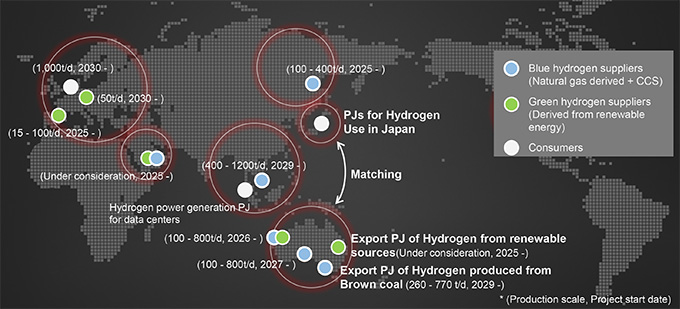Initiatives for Hydrogen
Kawasaki Hydrogen Road
In our lives today, we rely on fossil fuels such as oil and natural gas for most of our energy resources. However, this causes serious environmental problems such as global warming and always carries the risk of resource depletion. We must secure energy stably. At the same time, we must give consideration to the global environment. A solution to these two issues is "hydrogen energy". We want to provide people all over the world with a new future brought about by hydrogen energy. We have already begun initiatives that bring together the comprehensive strength of the Company.
The Role of Kawasaki
Hydrogen is a clean energy that can be extracted from various substances and does not emit CO2 when it is burned. The preparation of the infrastructure for the utilization of hydrogen as energy is about to begin all over the world. Among those preparations, the Company is mainly taking on the development of the "storage and transportation" infrastructure, particularly for the liquefaction, transportation and receiving terminals. The Company is contributing to the construction and expansion of the supply chain for the hydrogen market, which is expected to expand in the future. The Company's technology connects the sites of hydrogen production with the sites of hydrogen consumption with the creation of a new route called the Hydrogen Road.

2030 Targets/KPI for Hydrogen Transportation
- Hydrogen transportation volume: 225,000 tons (per year)
- Reduction of CO2 emissions by using hydrogen energy: 1.6 million tons
Hydrogen Transportation and Storage (= Carry and store hydrogen)
When hydrogen is cooled to the cryogenic temperature of minus 253°C, it changes from a gas to a liquid and its volume is reduced to 1/800th. Reducing the volume dramatically improves the efficiency of storage and transportation, so it enables the distribution of more hydrogen. Among the many methods of hydrogen transportation available, the transportation of liquefied hydrogen is an extremely efficient method and is a technology that has already been put into practical use. That transportation makes use of the achievements of our company in our many years of delivering carriers, storage and receiving terminals for LNG, and cryogenic liquid hydrogen storage tanks.
Transportation - Marine transportation
In order to utilize hydrogen as a next-generation energy source, there are requirements for the technology to transport large amounts of hydrogen efficiently and safely. The Company built the first LNG carrier in Japan in 1981 and has continued to be a leader in cryogenic technology for marine transportation. By combining the shipbuilding technology and cryogenic technology that the Company has cultivated over many years, the Company is working to develop the world's first liquefied hydrogen carrier.
Transportation - Overland transportation
(Liquefied hydrogen transportation container)
As the demand for hydrogen energy increases, there is a need for a means of transporting large amounts of liquefied hydrogen over land to the site of consumption. The overland transportation of liquefied hydrogen at minus 253°C is made possible with the thermal insulation technology that the Company has cultivated through the development of LNG storage tanks.
(Compressed hydrogen trailer with composite container)
With the full-scale introduction of fuel cell vehicles into the market, the building of hydrogen stations is progressing in various regions. The Company has developed Japan's first compressed hydrogen trailer equipped with a composite container, to transport hydrogen produced at domestic hydrogen production facilities to an off-site hydrogen station and then store and supply it.
Store
(Liquefied hydrogen storage tank)
In a liquefied hydrogen storage tank, the liquid stored is constantly vaporizing under the effects of the heat from the sun and other external sources. Technology to minimize the generation of this gas, which is called "boil-off gas", is essential for any long-term storage of liquefied hydrogen. For liquefied hydrogen, which is at the very low temperature of minus 253°C, the Company has developed thermal insulation technology that is even more advanced than that for LNG storage tanks, to realize a high-performance liquefied hydrogen storage tank that suppresses boil-off gas as much as possible.
Steps Toward the Realization of a Hydrogen Society
The Company began initiatives for the realization of a hydrogen society ahead of other companies around ten years ago, by utilizing cryogenic technology that makes it possible to liquefy hydrogen and then transport it in large amounts.

The Company is currently participating in the CO2-free Hydrogen Energy Supply-chain Technology Research Association (HySTRA) and an Australian consortium which is conducting a hydrogen supply chain verification test. These two groups are conducting the world's first international liquefied hydrogen supply chain construction verification test (= pilot project) between Japan and Australia. The role of our company is mainly in the transportation and storage facilities. Success in this pilot project will demonstrate the technological, safety and operational feasibility of the long-distance marine transportation of hydrogen, and will be a big first step toward the realization of a society in which hydrogen can be used widely by anyone.
In the pilot project, the hydrogen is produced from brown coal. However, cooperation will be continued to make it possible to produce clean hydrogen by the time of the commercialization in around 2030. This will be achieved by implementing CO2 capture and storage (CCS) in cooperation with the CCS project being promoted by the Australian Federal Government and the State of Victoria, and by using renewable energy for the power used for the liquefaction. In addition, as one of the world's leading commercial-scale green hydrogen projects, we are considering importing hydrogen produced and liquefied from renewable energy sources to Japan, and have started a feasibility study for a demonstration in the middle of 2020.
Our company has received approximately 50 requests from around the world for the examination of hydrogen-related projects. The scale of these projects is planned to reach 300 billion yen in 2030 and 500 billion yen in 2040. Against this backdrop, we plan to actively expand our supply chain for clean hydrogen such as green hydrogen from renewable energy sources and blue hydrogen with CCS.

Through a commercialization demonstration in the mid-2020s, our company will work on the early development of liquefied hydrogen carriers and various other equipment for use in a commercial-scale international supply chain. We will not limit the hydrogen source to "brown coal" and will contribute to the achievement of the Japanese government's target of introducing 3 million tons of hydrogen in 2030.
Other Initiatives
In order to realize a hydrogen society, in addition to the preparation of supply chain infrastructure as described above, it will also be important to prepare standards and rules for the handling of the hydrogen. The company is also promoting efforts toward international standardization, because we believe that the development of rules will make it easier to use hydrogen globally, and that it will create opportunities and markets to enable the products and services that the company handles to spread throughout the world. We are also participating in several private initiatives related to hydrogen in Japan. Specifically, these are the following three initiatives.
Hydrogen Utilization Study Group in Chubu
This Group is considering concrete measures for the large-scale utilization of hydrogen and aims to start social implementation from the mid-2020s. It is considering the situation in the Chubu region regarding the hydrogen supply chain, the potential for hydrogen utilization, and the cost of hydrogen that will be acceptable on the demand side. The Group will organize the technical, financial, and institutional issues for the realization of the goals and will propose the necessary measures and business models that will lead to social implementation.
Kobe/Kansai Hydrogen Utilization Council
This Council is considering a business model for hydrogen utilization by combining the knowledge obtained from existing demonstration experiments with the resources of local businesses. It is creating a roadmap for the social implementation of a hydrogen utilization model in the Kansai region. The Council will clarify the issues for social implementation and make policy recommendations to the national and local governments.
Japan Hydrogen Association
This Association is aiming to build the hydrogen value chain. It is preparing functions for commercialization, public relations, and research, and implementing cross-sectoral efforts to build a hydrogen value chain. It is accelerating efforts toward social implementation for the realization of a hydrogen society and collaborating with financial institutions to promote the creation of funding mechanisms.
Contact
If you need more information about our business,
please feel free to contact us.





